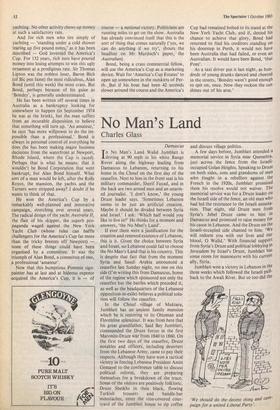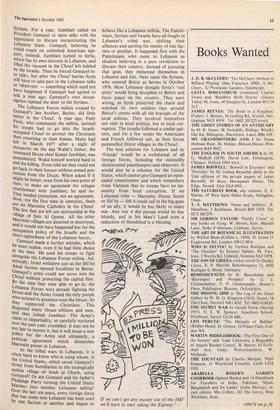No Man's Land
Charles Glass
Damascus In No Man's Land Walid Jumblatt is driving at 90 mph in his white Range Rover along the highway leading from Damascus to Lebanon, returning to his home in the Chouf on the first day of the ceasefire. Next to him in the front seat is his military commander, Sherif Fayad, and in the back are two armed men and an unarm- ed journalist. 'I don't know,' the young Druze leader says. 'Sometimes Lebanon seems to be just an artificial creation. Maybe it should be divided between Syria and Israel.' I ask: 'Which half would you like to live in?' He thinks for a moment and answers, 'the No Man's Land'.
If ever there were a justification for the creation and renewed existence of Lebanon, this is it. Given the choice between Syria and Israel, no Lebanese could fail to choose the No Man's Land that is his country. This is despite that fact that from the moment Syria and Saudi Arabia announced a ceasefire last Sunday night, no one on this side (I'm writing this from Damascus, home of the regime which sponsored not only the ceasefire but the battles which preceded it, as well as the headquarters of the Lebanese opposition-in-exile) believes a political solu- tion will follow the ceasefire.
In the Chouf village of Muktara, Jumblatt has an ancient family mansion which he is restoring to its Ottoman and Florentine splendour. It was from here that his great grandfather, Said Bey Jumblatt, commanded the Druze forces in the first Maronite-Druze war from 1840 to 1860, On the first two days of the ceasefire, Druze notables and officers, including deserters from the Lebanese Army, came to pay their respects. Although they have won a tactical victory in forcing Lebanese President Amin Gemayel to the conference table to discuss political reform, they are preparing themselves for a breakdown of the truce. Some of the visitors are positively folkloric. Druze Sheikhs in their black, flowing Turkish trousers and handle-bar moustaches, enter the vine-covered cour- tyard of the Jumblatt house to sip coffee and discuss village politics.
A few days before, Jumblatt attended a memorial service in Syria near Queneitra, just across the fence from the Israeli- occupied Golan Heights. Speaking to Druze on both sides, sons and grandsons of melt who fought in a rebellion against the French in the 1920s, Jumblatt promised them his resolve would not waiver. The memorial service was for a Druze leader on the Israeli side of the fence, an old man who had led the resistance to the Israeli annexa- tion. That night, old Druze men from Syria's Jebel Druze came to him in Damascus and promised to raise money for his cause in Lebanon. And the Druze on the Israeli-occupied side chanted to him: 'We will redeem you with our lives and our blood, 0 Walid.' With financial support from Syria's Druze and political lobbying In Jerusalem by Israel's Druze, Jumblatt has some room for manoeuvre with his current ally, Syria. Jumblatt won a victory in Lebanon in the three weeks which followed the Israeli pull- back to the Awali River. But so too did the `We should do the decent thing and cam- paign for a united Liberal Party'.
Syrians. For a year, Jumblatt called on President Gemayel to open talks with the Opposition to discuss reconstituting the Lebanese State. Gemayel, believing he could count on unlimited American sup- port, resisted. Jumblatt turned to Syria, which has its own interests in Lebanon, and filled the vacuum in the Chouf left behind by the Israelis. Then he forced Gemayel in- to talks, but after the Chouf battles Syria Will have to take part in the Lebanese talks as 'observers' — something which need not have happened if Gemayel had agreed to talk a year ago. Gemayel's own intran- sigence opened the door to the Syrians.
The Lebanese Forces militia created by Gemayel's late brother, Bechir, did little better in the Chouf. A year ago, Fady Frem, who commands the militia, insisted his troops had to go into the Israeli- occupied Chouf to protect the Christians then returning to their homes. Many had left in March 1977 after a night of massacres on the day Walid's father, the venerated Druze chief Kamal Jumblatt, was assassinated. Walid himself worked hard to end the killing. Frem told me they could not go back to their houses without armed pro- tection from the Druze. When asked if it might be better, even from his own point of view, to make an agreement for refugee resettlement with Jumblatt, he said no. They needed protection, not an agreement. Now, for the first time in centuries, there are no Maronite Catholics in the Chouf. The few that are left are surrounded in the village of Deir Al Qamar. All the other Maronite villages are deserted or destroyed, and it would not have happened but for the occupation policy of the Israelis and the short-sightedness of the Lebanese forces. Gemayel made a further mistake, which he must realise, even if he had little choice at the time. He used his troops to fight alongside the Lebanese Forces militia. Ad- mittedly, Israel withdrew just as the Shi'ite Amal faction opened hostilities in Beirut. Gemayel's army could not move into the Chouf without protecting the capital first. By the time they were able to go in, the Lebanese Forces were already fighting the Druze and the Army found the only people who resisted its presence were the Druze. So they supported the Christians. This disgusted many Druze officers and men, and they joined Jumblatt. The Army's claim to impartiality, so carefully nurtured over the past year, crumbled. It may not be too late to restore it, but it will mean a new Policy for the Army and ultimately, a political agreement which diminishes Maronite power in Lebanon.
In the tribal wars in Lebanon, it is often hard to know who is using whom. Is the United States, which saved Gemayel's Army from humiliation in the strategically useless village of Souk al Gharb, using Gemayel? Or are Gemayel and his father's Phalange Party turning the United States Marines into another Lebanese militia? Over the last ten years, every foreign force that has come into Lebanon has been used by one faction or another and begun to behave like a Lebanese militia. The Palesti- nians, Syrians and Israelis have all fought in Lebanon's tribal war, shifting their alliances and earning the enmity of one fac- tion or another. It happened first with the Palestinians who came to Lebanon as idealists believing in a pure revolution to liberate their country. Instead of pursuing that goal, they immersed themselves in Lebanon and lost. Next came the Syrians, who entered Beirut as heroes in October 1976. Most Lebanese thought Syria's 'real army' would bring discipline to Beirut and force peace on the country. They were wrong, as Syria preserved the chaos and watched its own soldiers race around Beirut's streets with all the bravado of the local militias. They involved themselves not only in local politics, but in local cor- ruption. The Israelis followed a similar pat- tern, and for a few weeks the Americans and French followed suit, as their forces pummelled Druze villages in the Chouf.
The best solution for Lebanon and its 'friends' would be a withdrawal of all foreign forces, including the ostensibly disinterested peacekeepers and observers. It would also be a solution for the United States, which cannot give Gemayel an open- ended commitment and which remembers from Vietnam that its troops have no im- munity from local corruption. If no Lebanese tribe — Maronite, Druze, Sunni or Shi'ite — felt it could call in the big guns of an ally, it would be less likely to make war. Any war it did pursue would be less bloody, and in No Man's Land even a reduction of bloodshed is a blessing.
If we can't get any money out of the IMF we'll have to start taking the Express.'







































 Previous page
Previous page